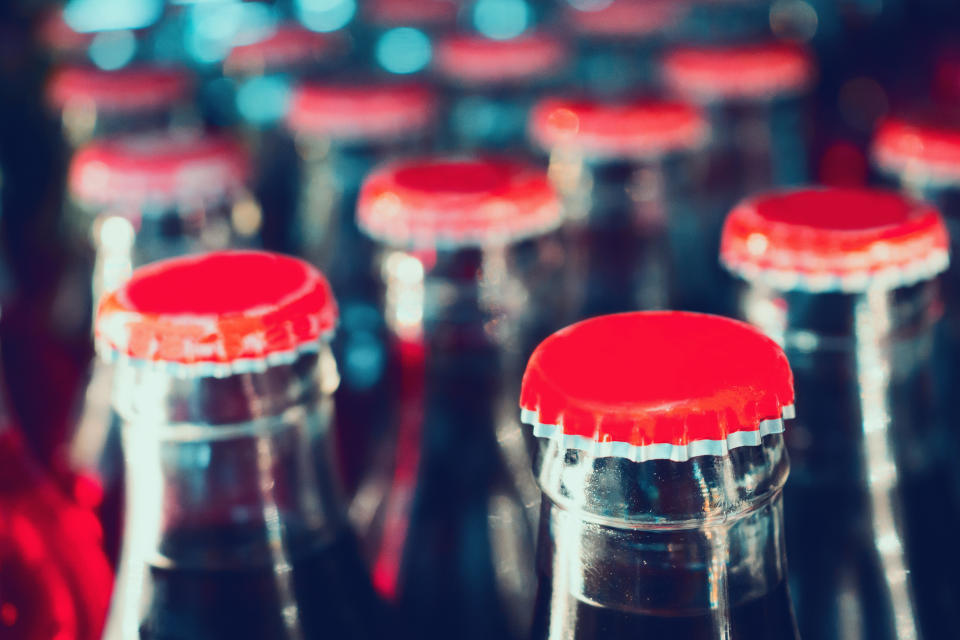A Surprising Source Fuels Coca-Cola's Robust Second Quarter
Back in February, investors panned a modest full-year 2019 outlook by The Coca-Cola Company (NYSE: KO), as the global beverages manufacturer envisioned a slower annual organic revenue growth rate than it had booked in 2018.
Any traces of investor angst have been erased by the company's latest earnings report, released on Tuesday. Results include a tweaked financial outlook that projects organic revenue expansion of at least 5% in 2019 -- which will equal the pace set last year. Investors responded positively to this revision and lauded the source of the company's underlying strength (which we'll discuss below): Shares jumped nearly 6% in Tuesday's trading session.
Note that all comparable numbers that follow refer to those of the prior-year quarter.
The Coca-Cola Company: The raw numbers
Metric | Q2 2019 | Q2 2018 | Change |
|---|---|---|---|
Revenue | $10.0 billion | 9.4 billion | 6% |
Net income | $2.6 billion | $2.3 billion | 11.5% |
Diluted earnings per share | $0.61 | $0.54 | 13% |
Data source: The Coca-Cola Company.
What happened with Coca-Cola this quarter?
Reported revenue of 6% was comprised of 4% concentrate sales growth and a 2% benefit from price and mix, which was coupled with 6% growth from acquisitions. This total of 12 percentage points was offset by foreign currency translation of 6%. Organic revenue, which strips away both acquisitions and currency effects, expanded by 6%.
Growth was led by a 3% rise in sparkling beverages. In particular, trademark Coca-Cola products, including original Coke, performed well, while Coca-Cola Zero Sugar continued to post double-digit sales expansion.
Among other categories, juice, dairy, and plant-based beverage volumes were flat, while water and sports drinks volumes improved by 2%. Conversely, tea and coffee volumes dipped by 3%.
Operating margin increased by 50 basis points to 29.9%. Adjusting for items affecting comparability, gross margin decreased by 30 basis points to 30.3%.
Following its nearly $5 billion acquisition of U.K.-based Costa Coffee in January, Coca-Cola introduced Costa's first bottled ready-to-drink (RTD) coffee during the quarter. In addition, on July 18, Coca-Cola announced a deal with bottling partner Coca-Cola Hellenic to introduce Costa Coffee in a wide variety of formats in 10 European markets in 2020.
The company launched its new Coca-Cola Energy product in several European markets during the quarter. Coca-Cola plans to extend the energy drink's distribution footprint from 14 to 20 countries by the end of the year, including rollouts in the major markets of Brazil and Mexico. On July 1, Coca-Cola announced that an arbitration tribunal had ruled in the company's favor in its dispute with Monster Beverage Corporation. Essentially, the panel deemed that energy drinks Coca-Cola markets under its own existing trademarks won't violate a noncompete provision within the company's agreement to exclusively market and distribute Monster's energy drinks worldwide.

Image source: Getty Images.
Management's comments
During Coca-Cola's earnings conference call on Tuesday, CEO James Quincey provided factors behind the somewhat surprising growth in trademark Coke-branded products. Quincey explained that packaging architecture, slightly healthier variants of Coke, and entry into newer categories may collectively help stem years of volume declines in Coca-Cola's flagship product:
Importantly, we are seeing healthy household penetration growth for our sparkling soft drink portfolio. It's also encouraging [that] Coke Zero Sugar is now in its third year of double-digit volume growth. Along with a focus on smaller packaging and premium innovation, year to date we are growing trademark Coke revenue faster than transactions, [growing] transactions faster than volume, and reducing calories -- which we believe is a winning strategy for the future.
Our innovation pipeline for Coke trademark expanded in April with the launch of Coke Energy, offering the edge of a great refreshing taste and an inclusive brand. The energy occasion is fast-growing and expanding in multiple spaces to satisfy more consumers. We remain fully committed to our partnership with Monster and we believe there are opportunities to capture even more value in the energy category for the Coca-Cola system and to bring new drinkers into a rapidly evolving category. The initial results are encouraging.
Looking forward
Given its vigorous second quarter, Coca-Cola raised its full-year revenue and operating income guidance alongside earnings. The company now expects full-year organic revenue growth of 5%, up from its former projection of 4% year-over-year expansion. Coca-Cola also anticipates operating income growth of 11%-12% on a constant currency basis, versus last quarter's full-year outlook for 10%-11% growth.
As for the bottom line, for now, the organization is preserving its previous target. This brackets adjusted earnings per share (EPS) in a range of -1% to +1% against last year's adjusted EPS of $2.08.
More From The Motley Fool
Asit Sharma has no position in any of the stocks mentioned. The Motley Fool owns shares of and recommends Monster Beverage. The Motley Fool has a disclosure policy.

 Yahoo Finance
Yahoo Finance 